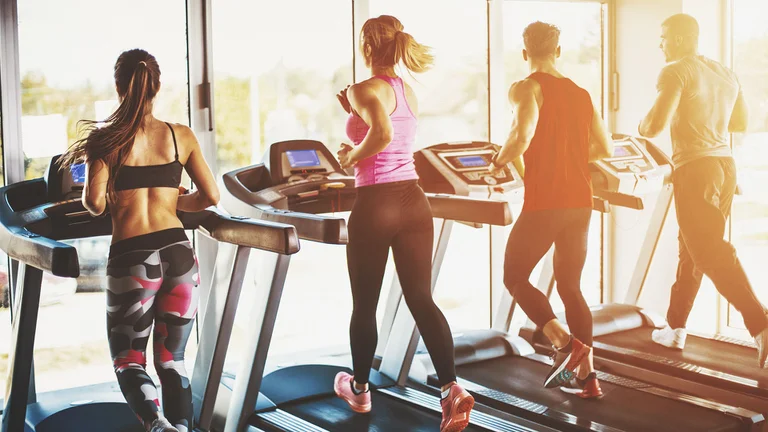A recent study conducted by researchers at the University of Pennsylvania and recently published in the magazine Nature ensures that the explanation for this fatigue and lack of motivation for physical exercise would be in the intestine.
Specifically, the researchers found that “changing the millions of gut microbes in the microbiome it can get people off the couch and motivate them to exercise.” At least that’s what happened in the work done on mice.
“Exercise exerts a wide range of beneficial effects for a healthy physiology. However, the mechanisms that regulate an individual’s motivation to engage in physical activity remain incompletely understood, the study authors began to analyze in the publication. An important factor stimulating participation in competitive and recreational exercise is the motivating pleasure derived from prolonged physical activity, which is triggered by the exercise-induced neurochemical changes in the brain”.
And given the connection that is known to exist between the gut and brain the researchers decided to delve into this line of investigation.
The team focused on how and why Gut microbes encouraged the mice to run and keep running.
The crux -as they saw- is a chemical substance produced by the microbiome sending a signal from the gut to the brain, triggering a flood of dopamine that is released into the ventral striatum, the brain’s “motivation center,” which in turn triggers the desire to exercise.
And while it’s clear that mice aren’t men, the study pushes a relatively new field of gut-brain interaction into new territory.
Can the gut directly influence the brain’s motivations and desires?
By looking for the molecules in the gut that stimulate the brain to want to be physically active, the study gave a first positive answer.
Neuroscientists Gulistan Agirman and Elaine Y. Hsiao, from the University of California, Los Angeles, were not involved in the study, but assessed that “if these findings are relevant to humans, they raise the question of whether targeting gut bacteria might improve mental processes associated with the decision to exercise in individuals, whether they are elite athletes or not.
The dilemma of exercise and lack of desire
Although everyone knows that exercising is good for overall health, and that its regular practice helps control weight, lower the risk of heart disease, improve mental health and mood, and even combat aging and dementia; many times it is difficult to find motivation to do it.
And despite the fact that psychology was blamed for years as the main culprit, for Agirman and Hsiao, the new study suggests that the gut microbiome could also provide a great motivational drive.
The gut-brain connection is one of the most influential discoveries of the last decade. The brain does not exist in a vacuum. Rather, molecules and hormones in the body can significantly affect its function.
Chemicals released by the liver, for example, boost memory function in aging mice after exercise, generating more new neurons in the dentate gyrus, the “nursery” in the hippocampus, a critical region for memory.
And after remarking that “an important source of these systemic molecules is the gut microbiome,” the experts emphasized: “Their symbiotic microbes thrive within our intestines, helping to digest nutrients and supporting metabolism.”
A decade ago, neuroscientists surprisingly discovered that they also affect the brain. Killing the bacteria with antibiotics, for example, increases depressive symptoms in mice. Later studies found that certain microbes excrete chemicals as they digest food, which activates the vagus nerve, a major signaling pathway that runs from the gut to the brain.
They also help the body respond to exercise. Specific bacterial groups have emerged in the gut “as key regulators of exercise performance,” Agirman and Hsiao said. Typically, this occurs through chemicals excreted by microbes to generate energy, or those that help remove molecules that lead to physical exhaustion, such as lactate.
The new study asked: can the gut microbiome directly shape our desire to exercise by affecting brain function?
“These findings indicate that the rewarding properties of exercise are influenced by gut-derived interoceptive circuitry and provide a microbiome-dependent explanation for inter-individual variability in exercise performance. Our study also suggests that interoceptomimetic molecules that stimulate gut-derived signal transmission to the brain may enhance motivation to exercise.”
Why is the gut microbiome related to motivation?
The answer seems to be dopamine. Often referred to as the “pleasure chemical,” it has several functions in the brain including flagging errors that don’t fit predictions and directing fluid movements. But its best-known function is to combine movement and reward, which occurs in a deep part of the brain called the ventral striatum, a part of the brain’s “reward center.”
By delving into the data of the microbiome of the mice, the team found that the athletic mice had a population of gut bugs that were particularly good at secreting fatty acid amides (FAAs).
Acting as “keys,” these chemicals then activated a receptor “lock”: the CB1 receptor that sits on the outside of a specific type of sensory neuron within the gut (yes, the gut has neurons, and yes, the CB1 receptor it is also the target of the main chemical components of marijuana).
These specialized neurons then send electrical signals directly through the spinal cord to the striatum of the brain, flooding it with a hit of dopamine.
In contrast, mice without intestinal bacteria they didn’t have this dopamine spike. A little more research found that their brains had a high level of an enzyme that quickly chews up dopamine, essentially killing their “runner’s high.”
However, giving them a dose of FAA as a dietary supplement or transferring FAA-producing gut bacteria to their intestines improved their running games.
As Agirman and Hsiao concluded, “the authors have shown that gut microbes modulate the circuits involved in the motivation needed to maintain physical activity in mice.”






